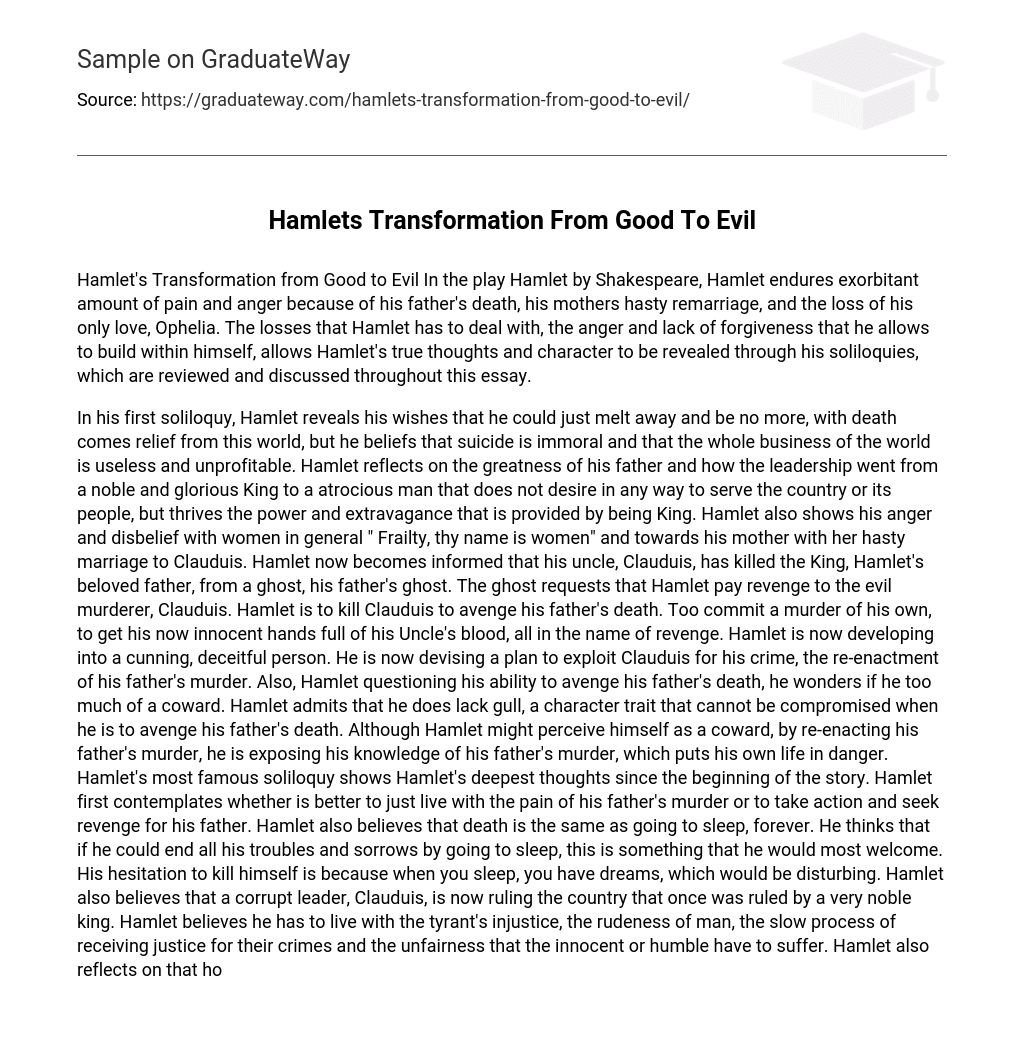Shakespeare’s play Hamlet depicts the protagonist undergoing a significant transformation from good to evil. This change is triggered by the intense anguish and rage he experiences following his father’s death, his mother’s hasty remarriage, and the loss of his beloved Ophelia. These tragedies instill within Hamlet a deep-seated resentment and an inability to forgive, which compel him to divulge his genuine thoughts and character through soliloquies. This essay will examine and analyze these introspective speeches. In Hamlet’s initial soliloquy, he articulates his desire to vanish and escape from the world as death promises relief. Nevertheless, he considers suicide morally reprehensible while regarding life pursuits as ultimately futile and unprofitable.
Hamlet contemplates the transition in leadership from his noble and glorious father to a vile man who prioritizes power and extravagance over serving the country and its people. He expresses his anger and lack of trust towards women, stating “Frailty, thy name is women,” and is particularly upset with his mother for hastily marrying Claudius. Hamlet learns from his father’s ghost that his uncle, Claudius, is responsible for murdering his beloved father. The ghost urges Hamlet to seek revenge upon the wicked murderer, Claudius.
Hamlet, fueled by his desire for revenge, plans to murder Claudius to avenge his father’s death. His once innocent hands now thirst for his uncle’s blood as he seeks to carry out this act of retribution. As Hamlet grows more cunning and deceitful, he cunningly devises a plan to exploit Claudius and stage the re-enactment of his father’s murder.
Hamlet is uncertain about his capacity to avenge his father’s death and contemplates whether he lacks the bravery required for such an act. He acknowledges his deficiency in courage to pursue vengeance for his father’s assassination. Nonetheless, despite viewing himself as a coward, Hamlet reveals his awareness of his father’s murder by re-enacting it, thereby endangering his own life. His renowned soliloquy articulates his deepest thoughts from the commencement of the narrative. Initially, he reflects on whether enduring the agony of his father’s murder or taking action and seeking revenge is preferable.
Hamlet holds the belief that death resembles eternal slumber. He welcomes the idea of escaping his troubles and sorrows by sleeping indefinitely. However, he hesitates to take his own life because sleep entails disturbing dreams. Additionally, Hamlet believes that a corrupt leader named Claudius now governs a country once ruled by a highly honorable king.
Hamlet believes that he must endure the tyrant’s injustice, the rudeness of man, the slow process of obtaining justice for crimes, and the unfairness that innocent or humble individuals have to endure. Furthermore, Hamlet contemplates how our conscience can make us cowardly by causing us to ponder our actions and their consequences. At present, Hamlet has a chance to privately converse with his mother for the first time. He plans to convey his emotions towards her but assures that his words will be sharp, even though he will not cause physical harm.
Polonius has come up with a scheme to secretly listen in on Hamlet’s conversation with his mother by concealing himself behind a curtain. The purpose of this scheme is to determine whether Hamlet is genuinely insane. However, when Hamlet becomes aware that there is something hidden behind the curtain, which he believes to be Claudius, his thirst for revenge overpowers his rationality. Consequently, he unintentionally ends up killing Polonius. Throughout the play, Hamlet has been recognized for his careful deliberation before taking action. Nevertheless, this impulsive act appears to seal his destiny. Now, Hamlet takes the opportunity to contemplate on the series of events that have unfolded and how they have worked against him, ultimately intensifying his craving for vengeance.
If a man performs virtuous and immaculate deeds, does this define his humanity. The one who has given us the ability to reason and possess godlike intellect, has only granted us one part wisdom and three parts cowardice. Thus, he questions why he continues to live and speak these words. “Observe this army of great magnitude and vigor, led by a gentle and fragile prince, whose spirit is inflated with divine ambition.” Hamlet emphasizes the way in which a righteous and pure spirit can be crushed by ambition; the longing to achieve fame and acceptance. “My thoughts must be filled with violence or be deemed worthless.” Hamlet has now revealed his own inner conflict; a righteous and pure spirit that has been crushed by his burning desire for revenge against Claudius.
Throughout Shakespeare’s play Hamlet, the character of Hamlet starts off as virtuous and independent. However, he falls prey to evil and corruption, refusing to forgive Claudius for killing his father and his mother for quickly marrying Claudius. Hamlet’s drastic transformation is evident in his final soliloquy when he declares “my thoughts be bloody or be nothing worth.” This moment signifies his descent into a vengeful individual, ultimately leading to his untimely demise.





